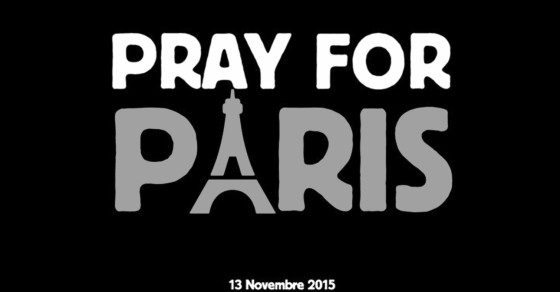95th anniversary of the Pentecostal movement in Bulgaria
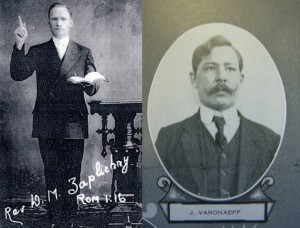 The church in Bulgaria is celebrating the 95th anniversary of its Pentecostal movement in 2015. We were able to participate in this season of celebration and honoring heroes of the faith through a series of lectures and video broadcasts on various topics of Pentecostal history, doctrine and praxis. Additionally, in 2015 we were able to prepare and publish a Bulgarian Prayer New Testament and the Bulgarian translation of Ivan Voronaev’s biography we authored back in 2010. We are thankful to the Lord for this opportunity to minister to the Bulgarian congregation and are looking forward to the Azusa Revival anniversary in 2016.
The church in Bulgaria is celebrating the 95th anniversary of its Pentecostal movement in 2015. We were able to participate in this season of celebration and honoring heroes of the faith through a series of lectures and video broadcasts on various topics of Pentecostal history, doctrine and praxis. Additionally, in 2015 we were able to prepare and publish a Bulgarian Prayer New Testament and the Bulgarian translation of Ivan Voronaev’s biography we authored back in 2010. We are thankful to the Lord for this opportunity to minister to the Bulgarian congregation and are looking forward to the Azusa Revival anniversary in 2016.
Celebrating 25 Years in the Ministry
We’ve completed another successful term of ministry for 2015 marking a decade since the start of Mission BULGARIA in 2005 and also our 25th anniversary in the ministry. From humble beginnings in September of 1990, God has taken us to a full quarter century of ministry literally throughout the globe.
As the Thanksgiving season is now upon us, we will be commemorating this event more extensively with a series called “25 Years of Miracles.” The series contains testimonies with various healings and miracles from our ministry, which we’ve collected and recorded through the years.
We are grateful to the Lord for giving us the opportunity to preach the Gospel and be a part of your life through our ministry. Thank you for your partnership and friendship through the years and Happy Thanksgiving!
Empire State Church
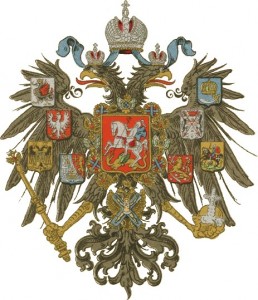 First Things First magazine recently published a religion and public life article on the Russian church. The focus was on orthodoxy and its historic symbioses with the political state. Several remarks from various social observations are in order.
First Things First magazine recently published a religion and public life article on the Russian church. The focus was on orthodoxy and its historic symbioses with the political state. Several remarks from various social observations are in order.
First off, the article seems to have been written by a person who never lived under socialist Soviet Russia and therefore presents a one-sided interpretation of the period. In order words, the information presented is true, but it’s limited to a single political, social and most importantly spiritual view interpretation. The used terminology of “de-Sovietization” is good example for the interpretive limitation. Other post-communist countries properly use the terminology “de-socialization” or even “de-communization,” though no country has ever reached a truly communist state.
Furthermore, the article’s purposefully excludes millions of Russian Catholics, evangelicals and Armenian Christian believers in Russia who were also severely persecuted under the Regime and were not allowed as much freedom of worship as the state Orthodox Church. They cannot be placed outside the perimeter of the revival movements after the Fall of the Berlin Wall, because many of those revivals happened first within their congregations and then influenced the Orthodox Church
The orthodoxy of the described state church is also under question since there’s never been a true Russian orthodox church. Eastern Christianity in Russia is rooted in the Greek Orthodox Church and heavily influenced by the 9th century Bulgarian Christianization of the Slavs prior to reaching Russia. Built after the early byzantine ecclesial model, the Russian church never experienced a true separation of church and state. One of the foundations of Orthodoxy since Constantine the Great has been a co-existential paradigm in the form of symbioses between the Orthodox Church and the political state. Thus, a true Orthodox church has always been an Empire church.
The article further omits historic communist influence of state police (KGB) over the church. During the Regime, KGB agents not only infiltrated Orthodox dioceses, but dictated the course of the church via specifically trained secret agents posing as priests within the church. Many of these agents were placed in key leadership positions as bishops and even the top patriarch of the Russian church. No one could obtain such position or any hierarchy promotion without signing up to cooperate with the state police. Until this influence, which continues in the church today, is exposed and the church is purified from all communist influence through “lustration,” there can never be an independent Russian church – it will always be an Empire church – with a capital “E,” and small “c.”
#PRAYforPARIS
POLICE on STRIKE in BULGARIA
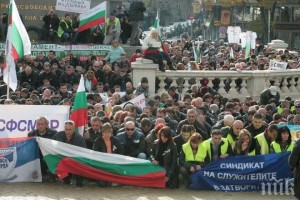 Bulgarian police has been on street strike for a week now. Syndicates warn that army and firefighters may join
Bulgarian police has been on street strike for a week now. Syndicates warn that army and firefighters may join
In the same week:
- Bulgaria’s ruling Socialists vow to stay despite protests
- Over 6,000 immigrants await to enter at the border with Greece
- Websites of key institutions collapsed on election day
- Two rocket launchers fired in Sofia during week of second round voting
- Bulgarian Trade Unions warned of more strikes and protests
- The police blocked Sofia in rush hour on several occasions
- Leader of a parliamentary represented party was detained and his diplomatic immunity was voted down by Parliament
- Political coalition partners quarreled in front of millions of TV viewers
- Dollar value in Bulgaria rises from 1.78 to 1.82 BGN (Bulgarian currency)
Hundreds of Bulgarian policemen, firemen and prison guards staged a spontaneous protest on Tuesday against cuts to their pensions and benefits, testing the authority of the center-right government. The demonstrators blocked major roads in the capital Sofia and held rallies in several other cities, demanding the resignation of Interior Minister Rumyana Bachvarova, who is trying to force through the changes.
Street protests have grown in Bulgaria, the European Union’s poorest member, in recent years. Voter frustration, especially with rampant corruption and organized crime, erupted in months of protests in 2013 and the country has had five governments in two years. “This is a very risky wave of insubordination,” said Tihomir Bezlov, a political analyst at the Center for the Study of Democracy. “This is an uncalculated move with unpredictable consequences.”
Staff like police who are paid from the interior ministry budget are not allowed to strike, take a second job or join a political party; in return they are exempt from paying social security contributions. But police are threatening to keep up daily protests and road blockades after negotiations with the finance ministry failed to result in the withdrawal of its 2016 budget plans. These include cutting lump sum retirement payouts to 10 times monthly net salary, from the current multiple of 20. The measures would also slash annual paid leave to 20 days from 30, and reduce extra pay linked to length of service.
Henry Kissinger and Russia’s Prophetic Destiny in Syria
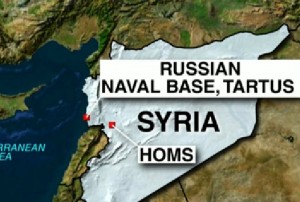 Henry Kissinger just wrote a Wall Street Journal piece called “A path out of Middle East Collapse.” It starts with the disastrous collapse of the power balance in the Middle East. And because he writes in long, thought-provoking sentences, it’s worth focusing on some of his high points.
Henry Kissinger just wrote a Wall Street Journal piece called “A path out of Middle East Collapse.” It starts with the disastrous collapse of the power balance in the Middle East. And because he writes in long, thought-provoking sentences, it’s worth focusing on some of his high points.
1. “With Russia in Syria, a geopolitical structure that has lasted four decades is in shambles.”
2. Four Arab states have ceased to function: Libya, Syria, Iraq, and Yemen. All are at risk of being taken over by ISIS, which aims to become a global caliphate governed under shariah law.
3. The U.S. and the West need a coherent strategy. We don’t have one now.
4. Treating Iran as a normal power is wishful thinking. It could happen over time. But today, Iran “is taking on an Armageddon dimension.”
Israel is in the maelstrom, but so is the rest of the world, which is why Russia is making an unprecedented military intervention in Syria. Putin is protecting Russia first of all.
5. “So long as ISIS survives and remains in control of a geographically defined territory, it will compound Middle East tensions… The destruction of ISIS is more urgent than the overthrow of Bashar Assad.”
6. “The US has already acquiesced in a Russian military role.” (Vladimir Putin has suggested a new Russo-Western alliance, on the World War II model.)
Given the general failure of political will in the West, combined with Putin’s strategic clarity, a practical alliance could work. Russia’s recent reactivation of the “friendship and cooperation treaty” with Syrian President Bashar al-Assad has prophecy students considering whether this move will prove to be significant toward ushering in the Antichrist. Steve Magill, author of the new book Revelation and the Age of Antichrist, says “Russia’s revived treaty with Syria is important because the Antichrist will appear out of Syria. Scripture also records Russia as the feet of the Antichrist ordained to mobilize his empire.”
Magill notes that in Daniel 7 an empire with the national symbol of a bear will be on the world stage concurrently with three other empires, also known by their animal symbol. These empires are identified as a lion with eagle wings (Great Britain and the United States); a bear (Russia); and a leopard (Islam). Never in the history of the world have four empires with these animal symbols appeared on the world stage at the same time.
Revelation 13:2 describes the role each of these empires have in establishing the Antichrist’s empire. Great Britain and the United States are recorded as the Antichrist’s mouth/voice to set the agenda and lead the world toward establishing the new global world order. Russia, the bear, is recorded as the feet of the Antichrist to realign and support the Middle-East landscape. Islam, the leopard, is recorded as the body of the Antichrist’s empire to which America, Great Britain, and Russia will be attached to make the earth’s final empire, the Antichrist empire.
When Antichrist’s empire is formed, it will be the fourth, brutal beast of Daniel 7, the composite beast of Revelation 13:2, and the new world order realigning all nations into ten economic/political regions, known as the ten toes of Daniel 2:42, 7:24-25, and the ten horns of Revelation 13:1. Russia’s Syrian aggression is one more confirmation that the last days are ending and earth’s last seven years and the age of Antichrist are at the door. It appears the feet of the Antichrist’s empire is getting ready to attach itself to Islam, the body of the Antichrist.
The Life and Ministry of Rev. Ivan Voronaev published in Bulgarian
![51Sa1IcA8OL._SY344_PJlook-inside-v2,TopRight,1,0_SH20_BO1,204,203,200_[1]](https://cupandcross.com/wp-content/uploads/2014/03/51Sa1IcA8OL._SY344_PJlook-inside-v2TopRight10_SH20_BO1204203200_1.jpg) We are pleased to announce that some five years after its first publication in English and Russian, our research on the Life and Ministry of Ivan Voronaev is now available in Bulgarian as well. This edition includes the Story of the Voronaev Children, the Correspondence of Ivan Voronaev plus a concluding chapter on the First Pentecostal Believers and Churches in Bulgaria. The book is published for the 95th anniversary of Bulgaria’s Pentecostal movement.
We are pleased to announce that some five years after its first publication in English and Russian, our research on the Life and Ministry of Ivan Voronaev is now available in Bulgarian as well. This edition includes the Story of the Voronaev Children, the Correspondence of Ivan Voronaev plus a concluding chapter on the First Pentecostal Believers and Churches in Bulgaria. The book is published for the 95th anniversary of Bulgaria’s Pentecostal movement.
This book tells the story of the life and ministry of the family who brought the message of Azusa Street to Eastern Europe and Russia. The research has taken close to a decade to complete. It started with a brief article on the beginning of the Pentecostal movement in Bulgaria, where unfortunately most church archives were destroyed during Communism. Consecutively, the research led my wife and I on a long journey from the Southern Baptist Historical Library and Archives in Nashville, to the Assemblies of God headquarters in Springfield and the Graduate Theological Union at Berkeley.
We are grateful to the Flower Pentecostal Heritage Center for making available the ministerial file of Rev. Ivan Effimovich Voronaev kept in their denominational archives. We are deeply indebted to Dr. Albert Wardin for opening the doors for research in Nashville and Berkeley, where most documentation referring to Voronaev’s ministry as a Baptist is preserved. We are also thankful to Oleg Bronovolokov of the Ukrainian Evangelical Theological Seminary in Kiev, who helped with the input of various Russian documents pertaining to the Voronaevs.
Both papers included in this book were presented at two consecutive meetings of the Society for Pentecostal Studies in Minneapolis (2010) and Memphis (2011). The first paper, although heavily edited to fit the format, was published in vol. 30 (2010) of Assemblies of God Heritage magazine under a new title, “Ivan Voronaev: Slavic Pentecostal Pioneer and Martyr.” Some of the historical data we presented in the article was published openly for the first time. Our research was further mentioned in the December, 2010 AG Heritage editorial. The Bulgarian “Evangel” also published our translations of Voronaev’s correspondence.
In 2011, Vladimir Franchuk, translated parts of the Voronaev’s papers in Russian and included it in his book “Revival: from the center of Odessa to the ends of Russia,” thus making our research available to the Slavic people just in time for the 90th Anniversary from the beginning of Ivan Voronaev’s Pentecostal ministry in Russia. Partial information from these papers was also used by several recent studies concerning Pentecostalism in Europe and the life and ministry of Rev. Dionissy Zaplishny. Unfortunately, with all this interest, little attention was given to the second paper concerning the Voronaev children until now. The last chapter on the First Pentecostal Believers and Churches in Bulgaria is published for the 95th anniversary of Bulgaria’s Pentecostal movement.
Read about the legacy of Ivan Voronaev:



